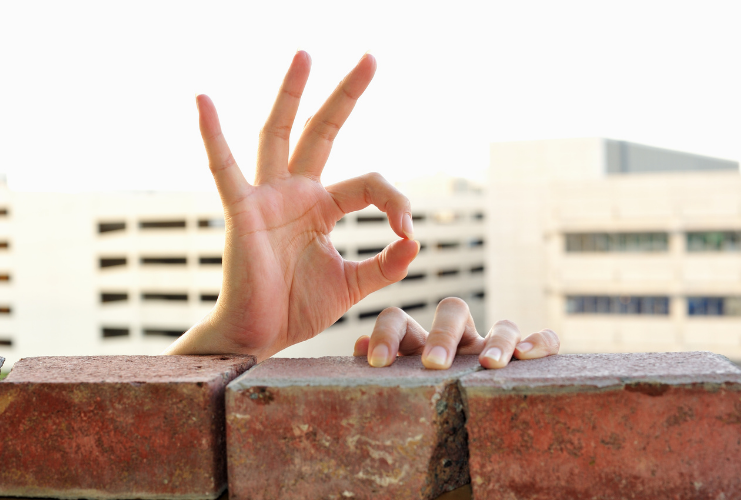Here’s What You Need To Know About Burnout
Feeling Dead Inside? Maybe It’s Burnout.
We’re in the middle of a pandemic, and not the one you think. I’m talking about something else — a burnout pandemic.
It’s been a stressful last few months, wouldn’t you agree?
All of these sudden changes — the lockdowns to mass unemployment, to the stay-at-home orders — have forced us to find new ways of coping with these new challenges.
And of course, the uncertainty of it all only makes things worse.
It’s safe to say that for many people, stress is at an all-time high. But what does that have to do with burnout?
It’s because stress and burnout are connected — the higher your stress levels, the higher your chance of getting burnt out.

The COVID-19 crisis dredged up lots of issues that have needed addressing for a long time. And even though it’s not exactly a niche subject anymore, mental health is one of them.
People are more open about their struggles and have access to more support networks, resources, and outreach programs than ever before.
And in the last decade, stress — and similarly, burnout — have become two of the most talked-about mental health topics.
Even so, there’s a lot of work still to be done.
Consider This:
- 37% of adults said their stress levels worsened between 2016 and 2017
- 14% of 18 to 29 year olds know someone diagnosed with burnout
- 23% of employers offer burnout prevention programs
But even though it happens all the time — and is honestly a serious public health problem — burnout is still a pretty vague issue.
Case in point: There’s still not an official definition for “burnout syndrome.”
That makes it really hard to get any insights into it — let alone accurate data — that can help experts assess how common it is.
You’ve probably been burnt out before — or you’re dealing with it right now.
Generally, if you want to stop something from happening in the first place, you have to understand it better. That’s how it works, right?
But if you’re dealing with something like burnout — which, as I said, is still relatively vague — are you just SOL?

No, you’re not, fortunately.
Burnout might be an obscure umbrella term that encompasses a lot of things, but it’s not an impenetrable brick wall. You can get over it by learning what experts currently know.
So What Is Burnout?
Even though there’s no set definition, the professionals have pretty good ways to describe burnout.
There’s this one, which focuses on the exhaustion aspect:
“A state of physical, emotional, and mental exhaustion caused by long term involvement in emotionally demanding situations.” – Ayala Pines and Elliot Aronson
Then there’s this one, which addresses disillusionment, which sits at the heart of burnout.
“A state of fatigue or frustration brought about by devotion to a cause, way of life, or relationship that failed to produce the expected reward.” – Herbert J. Freudenberger
Everyone has their limits, and at one point or another, you reach yours.

You’d think you would recognize when burnout’s about to happen, but it’s sneaky.
It creeps up on you gradually. And since it’s easy to mistake the signs as something else, you don’t realize anything’s wrong until you’re running on fumes.
And then, when you do want to get better, recovery can be just as exhausting because you have to address all the underlying problems that caused burnout to happen in the first place.
Even if you give yourself some much-needed R&R, you won’t get better if you still feel disillusioned and cynical.
Keep Your Eyes Peeled: Signs Of Burnout
Burnout shows up as physical, mental, and emotional problems — from sleep disorders, feelings of restlessness, chest tightness, and difficulty making decisions.
In other words, it looks a little bit like everything. And it’s related to so many health issues, which is why it needs to be taken seriously as a public health issue.
Chances are, you’ve probably felt at least one of the three most common signs of burnout.
- Physically and emotionally drained
- You’re giving your all, but it still feels like it’s not enough
- Even when you find success, you still feel dissatisfied

What Causes Burnout?
Stress. Stress causes burnout.
Remember how I said they’re connected?
That’s because when you get stressed, you open the door for burnout to slink into your life. Stress makes everything harder, including managing your self-perception, which is a huge reason behind burnout.
If your mental image of yourself doesn’t align with your reality, the disconnect creates a sense of disillusionment.
Ask yourself; do you:
- Struggle with perfectionism?
- Tend to blow off your mental and physical limits?
- Feel pressured to meet self-imposed (and probably borderline unrealistic) standards?
- Have an insatiable need for other peoples’ appreciation and recogonition?
- Feel like you have no control over your life?
- Need harmony in your surroundings? (Read: control)
- Feel incompetent, even though you have the skills to succeed?

Do you feel called out?
Because I sure do.
No wonder burnout hits like a sucker punch when these needs aren’t met.
Burnout can happen to anyone, but certain personality types are more prone to it.
When you reach your limits, you start stalling out, which wears you down while frustration builds up.
You stop feeling proud of your accomplishments and start feeling withdrawn. Feelings of emptiness make themselves at home.
Maybe your family and friends notice that you seem on edge. But chances are, if anyone says something to you, you’ll brush it off — because you’re okay!
But in reality, you’re not.
So what do you do?

Burnout Prevention Tips
(From someone who deals with this a lot.)
Honestly, the best way to kick burnout to the curb is by seeking help from a counselor or other professional. But sometimes that’s not an option. Maybe you’re quarantining at home, can’t afford it, or have no clue where to find a good therapist.
Here’s a pro tip that time management coach Elizabeth Grace Saunders gave The New York Times:
“I’ve seen that at the core, burnout prevention is about living out what is true about your body, your personality and your reality.
You don’t need a dream job. But in your overall life, you do need to find time to take care of your health, do things you find refreshing and have a sense of purpose.
The closer you are to living your truth, the less likely you are to burnout.”
Just like burnout has dozens of symptoms, there are dozens of ways to alleviate it, mostly by de-stressing. I say alleviate because you can’t really make it go away until you tackle the real problem (e.g., an unsatisfying job, living situation, etc.).
What you do really comes down to your preferences. Watching TV, reading, listening to music, and relaxing are the most common ways that people unwind, and even though they don’t make burnout totally disappear, they do make it easier to cope in the meantime.

Personally, I like playing relaxing passive games like Animal Crossing and Stardew Valley. Sometimes I read. I love looking at memes, but I have to be careful because negative content can make things worse.
In the meantime, your best bet is to learn how to avoid burnout before it sneaks up on you.
Listen To Your Body
No, like really: pay attention to what your body’s trying to tell you.
The human body is amazing, especially when you think about how it has built-in repair functions to get you back to your regular self.
When you start to feel any of the dozens of signs of burnout, your body is telling you to slow your roll because it can’t keep up.
That’s tough to do, especially for perfectionists, go-getters, and Type A’s. But you can’t understate the importance of listening to your bod.

My dad likes to say,
“When you’re hungry, eat. When you’re thirsty, drink. And when you have to go to the bathroom…go!”
I know I’m not the only person who’s been so engrossed in a task that I ignore something as basic as going to the bathroom until it’s finished.
Refusing to take a break when you know you need it — let alone quit — only ends up making the job more difficult and less enjoyable.
I say this as I blow off the thirst that’s nagged me for an hour. When discomforts like these distract you, it pulls away focus that should go toward what you’re working on at the moment.
Listening to your body helps you come back to your task feeling refreshed and re-energized.
But there’s more to it than taking breaks when you need it. You also need to give your body what it wants, which is usually a good night’s rest, good eats, and some movement.
Get Your Beauty Sleep
I really cannot stress how important this is.
For years, when I was a full-time student and wage slave, I treated sleep like a pesky chore.
But as I’ve aged, my ability to ignore my body’s need for sleep has slipped, and I’ve been forced to scrap the “sleep is for the weak” mentality that got me through school.
I now understand the importance of sleep — but more importantly, I respect my body’s need for it.

Once I started sleeping more — and doing things to sleep better — I became more mentally and emotionally resilient.
So, start by figuring out how much sleep your body needs.
The average for most adults is seven to nine hours, but some are just fine getting six while some — like me — need ten or more.
Whatever the amount, the purpose is to get enough sleep that you feel energized and focused throughout the majority of your day.
There are a million other benefits of sleeping well — my favorite, in particular, is feeling happier — but that’s a topic for another day.
If you feel the urge to stay up late, just remind yourself how crappy it feels when you wake up exhausted and compare that to the feeling of waking up well-rested.
Get Good Eats
They say you are what you eat, and while I have yet to turn into a tub of peanut butter, there is some truth behind it.
One thing that helps me not feel burnt out as often is making sure I don’t crash and burn day after day.
Since exhaustion is a symptom of burnout, finding healthy ways to maintain your energy will help you as you develop the physical, emotional, and mental resilience necessary to cope.
You know, and I know that some foods make you tired. So why not limit those things that only make you feel worse?

Again: pay attention to your body. Is there a time of day when you feel stupid lethargic? If you can, eat at regular intervals — developing an eating routine will help your body know what to expect and prevent it from crashing as hard.
Some experts suggest eating several small meals throughout the day to keep your blood sugar level.
But I — who am no expert — personally prefer some variation of intermittent fasting. However, IF isn’t for everyone and may aggravate burnout even more.
Pack a lunch the night before, set a reminder on your phone if you tend to put off eating because you’re balls deep in a task. And don’t forget to drink water!
Get A Move On
I’m not talking about a full-on workout, although 20 to 30 minutes of exercise does a lot to help your mental health.
I know that you are probably tired of hearing it (I know I am), but exercise is one of the best ways to lower stress.
The main reason why American adults continue to run is that it lowers stress.
(That’s why I do it. It’s the only thing that justifies stabbing side cramps and dealing with the elements.)

But the thing is, you don’t need to start running or hitting the gym to get the benefits of exercise. Even going on a walk is enough to do the trick.
Even five minutes of movement can improve your mental state.
It’s anything you can do to step away from the situation that is causing you stress so you can distance yourself from the negative feelings. While it won’t make the problems disappear, you can at least come back to them with a clearer mind.
Modify Your Mindset
Remember how I said I try avoiding negative content earlier? When I’m trying to stop burnout, I need a positive mindset to help uplift me. And if I’m always brought down by bad news, I’ll never get that.
When trying to figure out how to avoid burnout, look at your surroundings to determine what you can change and where you need to go to find other ways to fulfill your needs.
Here’s an analogy for you:
You’re in the middle of a small circle that’s inside of an even larger circle.
Within your small circle is everything within your control. But everything outside of that is out of your control.
Big circle problems might bother you endlessly, but you can’t do anything since you’re inside the small circle.
So save yourself the energy and focus on what’s happening in the small circle.

Or, you can adjust your expectations.
What do I mean by this?
Well, it’s like love languages. You might prefer showering your best friend with presents, but she’s more about quality time. Of course, she appreciates the gifts, but hanging out more often means much more to her. In this instance, changing your behavior to meet her needs is the best way to nurture your friendship.
Alternatively, quit expecting to find fulfillment in areas of your life that just aren’t delivering. Instead, look for other ways to find satisfaction and meet your needs.
Whether it’s enjoying some alone time, volunteering, or spending more time with loved ones, find something that fosters positive feelings like autonomy, accomplishment, and acceptance.
They will cushion you if you start to feel burnt out.
Say Bye-Bye To Burnout
Burnout is the worst, but by listening to your body, you can lower the chances of it happening.
But I’m not a professional, and sometimes, it takes a lot more than a blog post to feel better.
So if you can’t seem to shake it, consider seeing a professional.
The world is our oyster. That’s why we have to look out and care for each other and ourselves.
There’s a new post each week, so check the Blog and stay tuned for things like time management tips and more!

Sources
- Laporte, John. “Topic: Stress and Burnout.” Statista, www.statista.com/topics/2099/stress-and-burnout/.
- Mind Tools Content Team. “Avoiding Burnout: Maintaining a Healthy, Successful Career.” Stress Management Training From MindTools.com, www.mindtools.com/pages/article/avoiding-burnout.htm.
- Saunders, Elizabeth Grace. “Avoid Burnout Before You’re Already Burned Out.” The New York Times, The New York Times, 6 Nov. 2019, www.nytimes.com/2019/11/06/smarter-living/avoid-burnout-work-tips.html.
- SE, Schön Klinik. “Burnout: Causes, Symptoms & Diagnostics.” Schoen Clinic, 5 Apr. 2020, www.schoen-clinic.com/burnout.


